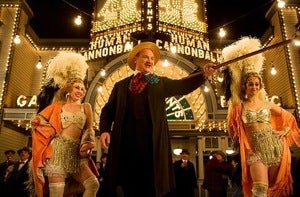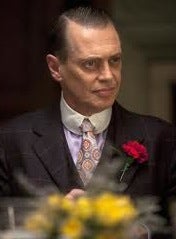HBO’s best chance to solidify its appointment-TV crown for years to come rests firmly in the hands of a fast-talking ex-Brooklynite who studied to be a car mechanic and scammed his way into Hollywood by creating a phony agency to represent him.
 Terry Winter, the creator and showrunner of the highly anticipated “Boardwalk Empire,” which premieres Sept. 19, is a former lieutenant to David Chase on “The Sopranos,” where he won two Emmys as writer and executive producer and was nominated for six more. He spoke with Eric Estrin about how he got into NYU without a clue, why he once chose being a doorman over journalism and how pretending to be a messenger boy and an agent helped him open the door to a new career.
Terry Winter, the creator and showrunner of the highly anticipated “Boardwalk Empire,” which premieres Sept. 19, is a former lieutenant to David Chase on “The Sopranos,” where he won two Emmys as writer and executive producer and was nominated for six more. He spoke with Eric Estrin about how he got into NYU without a clue, why he once chose being a doorman over journalism and how pretending to be a messenger boy and an agent helped him open the door to a new career.
I came to writing in a really circuitous manner. I had grown up in Brooklyn and had gone to a vocational high school, where I studied auto mechanics; so the idea of ever becoming a writer for a living was something that was completely alien to me.
I was really not prepped for college at all; I had never intended to go and didn’t even take the SAT’s. But a few years out of high school I changed my mind– I was in Greenwich Village, and I was on the campus of NYU, and I thought, well, this is a college; I’ll go here. It’s the God’s honest truth. I went into NYU and got a brochure, and that was pretty much the extent of my college research.
It became pretty apparent early on that my auto-mechanics degree was not gonna cut it in terms of getting into this college. But then I thought, well, if I took a major nobody else wanted, maybe I could eliminate my competition and get in that way. So I looked at the list of the most obscure majors they offered, and one was medieval history. I thought, well, who could be competing for this, so I said that that’s what I wanted to do.
A few weeks later I got a call from somebody at NYU, and they said, we have your application, and you have an auto-mechanics degree and you want to study medieval history — how did that happen?
I said, well, I’ve always been a fan of the Knights of the Round Table, and I think this is something I might like to do. And suddenly I was in NYU, without really having any idea of how to be a student. I was determined to get out of there in four years, so I went to school full-time during the day and worked full-time as a doorman at night. My education was fully financed by student loans.
I didn’t even know at the time that NYU taught courses in film and television. I didn’t know that world existed. But I did like to write, so I started taking journalism classes. I was a fan of movies and TV, but the idea of doing that for a living was so far outside the realm of my world view that it just didn’t even occur to me to study that.
When I was graduating I found out that starting pay for a journalist was less money than I was making as a doorman. I was working the midnight-to-8 shift and I was in a union and I was making probably in the mid-twenty thousands at the time in the early ‘80s, and starting salary if you were lucky to get a journalism job was probably gonna be like $12,000 a year. So I set my sights on law school and ended up going to law school at St. Johns University, and also ended up going to night school.
 So that was four years again and work during the day and student loans. So when I graduated from law school I was now $70,000 in the hole, and the only thing I was pretty convinced of was that I really didn’t want to be a lawyer.
So that was four years again and work during the day and student loans. So when I graduated from law school I was now $70,000 in the hole, and the only thing I was pretty convinced of was that I really didn’t want to be a lawyer.
I ended up taking a job at a big corporate law firm and was bored to tears. I was the world’s worst lawyer, and it was pretty clear to me that I needed to figure out what I wanted to do with my life. So I did some soul-searching, and you know, my deep, dark secret, once I was able to admit it to myself, was that I wanted to be a writer. Once I was able to say out loud I want to be a TV writer, I want to be a sitcom writer, which is where I kind of started, the world opened up for me.
So I packed up and I moved to L.A. I’d never been west of Chicago. I didn’t know a soul, but I just quit my job and I showed up in Los Angeles and started writing spec scripts.
I got a job as a paralegal just to pay the bills during the day and I started writing at night. I wrote a couple of sitcom specs that people really liked. But you need an agent to get a job and you need a job to get an agent. It was this catch-22 that I found myself in. I would cold-call agents and try to get them to read my stuff, and weeks would go by and then they’d forget who I was, and I thought, God, I’ve gotta figure a way to break into this.
So I went down to the Writer’s Guild. At the time they offered a list of agents who would take unsolicited manuscripts from people, and on the list was a guy I went to law school with — just sheer coincidence. So I called him up; he was an attorney in New York.
I said are you an agent now? And he said, No, I’m a real-estate attorney. I’m bonded as an agent, but I really don’t know anything about it. And I said, I don’t either, but I know I need an agent, so you’re it. Congratulations, you’re representing me.
So we made deal where I would create basically a phony agency with his name. I did this out of the Mail Boxes Etc. on Santa Monica Boulevard, and I got a voice-mail system and letterhead printed up. I said I’m gonna submit my work under your name, and if I get anything, I’ll give you ten percent like a real agent.
I took a day off from work and hit like every sitcom office in L.A., which at the time, there were like 26 sitcoms on the air. And I just walked in wearing a baseball cap and said, Yeah, hi, I’m the messenger from this agency and here are the scripts you wanted. And I thought, all right, at least my scripts are in the building where people theoretically could hire me.
A couple of weeks went by and I got a call on a Friday from Winifred Hervey Stallworth, who at the time was the showrunner for “Fresh Prince of Bel-Air,” and she was calling for Doug, who was my agent. And she said, Yeah, Doug, it’s Win Hervey from “Fresh Prince.” I read Terry Winter’s scripts and really think they’re great. We’d love to maybe talk to you about having him come in to pitch.
So I called Doug in New York. At this point it was like 4 in the afternoon in L.A. and 7 in New York, and he was already gone for the weekend. So I thought, Oh, God, I’ve gotta wait until Monday now. And then it occurred to me that Doug didn’t really know anything about being an agent, so I thought, you know what, I can just call and say I’m Doug and it’ll be easier to cut out the middleman.
I called her and she said, Oh, great, Doug. Oh, you know, “Fresh Prince” is sort of a teenage-oriented show. Does he have like one more teenage kind of script?
And I said, Yeah, he just finished a “Wonder Years” spec that’s really terrific — which was a lie. I didn’t have anything else at that point; she had everything I wrote.
I said, Terry’s out of town for the weekend, but I could probably get this to you by Tuesday. And she said, Yeah great, Tuesday’s fine.
I hung up the phone, and from Friday night until Tuesday afternoon, I cranked out a “Wonder Years” script, and then I threw the baseball hat back on, went as a messenger again and showed up at the office, flung it in the door, made sure nobody saw me, because at this point I was like the messenger, the agent, the client …
And they called me back and had me in to pitch some ideas. That was my first foot in the door.
Shortly thereafter I got accepted into the Warner Bros. sitcom writers workshop, which is really a godsend. And that led to my first job on a show called “The Great Defender” on Fox. That show was co-created by a guy named Frank Renzulli. Frank and I became good friends.
A couple of years later I got a videocassette in the mail from my agency; it was a pilot for “The Sopranos.” I watched this thing and I said, Oh my God, I have to be on this show. I know these guys. I grew up in Brooklyn sort of around this kind of world a little bit. I called my agent and said, You’ve gotta get me on this show.
My second call was to Frank, who was familiar with this world as well and, as it turned out, Frank had seen the pilot and he was in fact meeting with David Chase later that week. It turns out that Frank was the last guy David hired on the show, but Frank talked me up quite a bit to David, and when there was an opening, David brought me on, too.
I got to learn at the feet of David Chase at “The Sopranos” for nine years and watch him run that show, so when I had an opportunity to run “Boardwalk Empire,” I felt like I had learned from one of the best ever.




